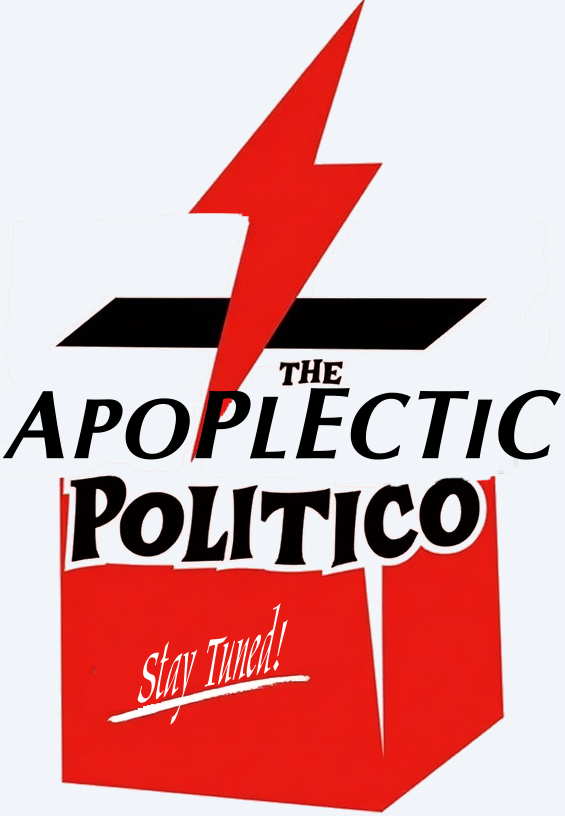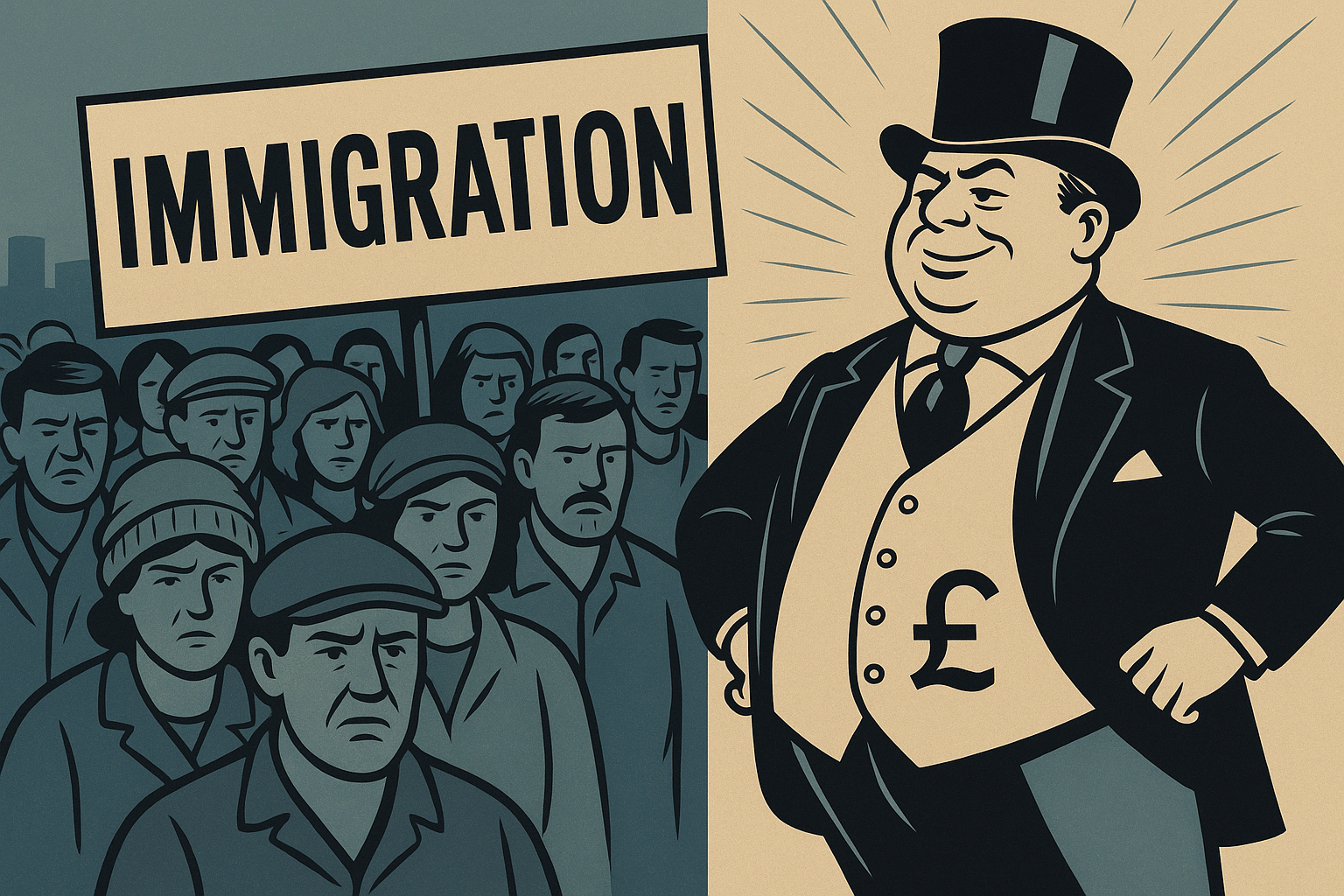How Immigration Panic and Authoritarianism Serve the Super-Rich
Over the past two decades, the UK has become a harsher place to live for ordinary people. Living costs are up, real wages are stagnant, public services are crumbling, and social mobility is in decline. Meanwhile, the wealthiest 1 percent are doing better than ever. This growing divide is no accident, and if you look closely, a pattern starts to emerge: blame the poor, blame migrants, and tighten control, all while the rich quietly grow richer and more powerful.
A Cost of Living Crisis with No Real Solutions
British households are paying more than ever for essentials. Housing, energy, and food prices have soared, while real wages remain stuck at levels seen more than a decade ago. The average worker in 2025 is still earning less, in real terms, than before the 2008 financial crash. This is not a blip, it is the result of political decisions that favour short-term profit and elite interests over long-term investment in people.
At the same time, vital public services like the NHS and local councils are under-resourced, stretched, and increasingly privatised. But instead of owning up to these failures, politicians and media figures repeatedly reach for a familiar scapegoat: immigrants.
For deeper insight into how austerity and privatisation have gutted public services, see The Hidden Cost of Public-Private Partnerships.
Blame the Migrants, Not the Millionaires
For years, government ministers and tabloids have blamed migrants for putting strain on housing, schools, and the NHS. Yet research from the Office for National Statistics and respected academic institutions shows that immigration has had a minimal impact on public services, and in many cases, a positive one. 1See ONS and Migration Observatory data on fiscal impact of immigration
The real cause of strain on services is decades of underfunding, austerity, and privatisation, not migration. But blaming migrants is politically convenient. It divides communities and deflects attention from the people actually responsible for the crisis, those making the decisions at the top.
This tactic has been used repeatedly throughout UK history, as detailed in Can We Really ‘Tear Down’ Bureaucracy for Efficiency?, which explores how calls to cut ‘red tape’ often result in consolidating power upward, not improving services.
The Authoritarian Turn
As the economic outlook worsens and inequality becomes harder to ignore, the government’s response has not been reform, it has been repression. In recent years, we have seen:
- New laws restricting the right to protest
- Expanded police powers to target activists and journalists
- Crackdowns on asylum seekers and refugees
- Legal curbs on judicial review and civil liberties
This authoritarian drift does not make the country safer or fairer, it makes it easier to suppress dissent. When people are struggling and angry, governments that serve elite interests often resort to control rather than accountability.
For a stark example of this trend in action, see Your Money, Their Rules: Why the New Fraud Bill Should Scare You, which details how new laws could allow the government to seize funds and suspend rights without due process.
Divide and Rule: An Old Strategy for a New Age
There is nothing new about the rich using division to maintain power. But today’s playbook is brutally efficient:
- Blame the “other” – immigrants, benefit claimants, the unemployed – for social problems
- Whip up culture wars to distract from economic inequality
- Pass laws to limit resistance – whether from protesters, unions, or journalists
- Cut taxes for the wealthy, deregulate their industries, and leave loopholes open
- Dismantle services for everyone else, forcing people to pay more or go without
It is no accident that the same think tanks and donors pushing for immigration restrictions and anti-woke politics are also lobbying for tax cuts for the rich and the dismantling of the welfare state. 2See research by Transparency International and DeSmog on political lobbying and think tank funding
Who Really Benefits?
Let’s be clear, none of this benefits the average person – not white working-class voters in the North, not middle-income families in the South, and not migrants trying to build a life in the UK. The people who gain are the same ones who fund political campaigns, shape media narratives, and hide their wealth offshore.
By keeping the population divided, distracted, and increasingly under surveillance, the powerful ensure there is no unified resistance to their agenda.
For an exploration of how AI and data may eventually be used to predict, or suppress, mass social unrest, read The New Psychohistory? Predicting Society in the Age of AI.
Final Thoughts: It Doesn’t Have to Be This Way
The truth is that the UK is not poor. It is rich in resources, talent, and potential. But that wealth is being hoarded and protected by a political system that works for the few at the expense of the many. The more the public is pitted against itself – citizen against migrant, North against South, worker against unemployed – the easier it becomes for the elite to tighten their grip.
It is time to stop falling for the distraction and start demanding accountability from those at the top. Our anger is valid, but it needs to be aimed at the right targets.
Footnotes:
1Research from the Migration Observatory shows immigration’s net fiscal impact is modest or positive. 2UK workers have experienced the slowest wage growth since the early 1800s. See the IFS report on living standards and poverty for an overview of wage stagnation trends and inequality. 3Tax loopholes, capital gains relief, and non-dom status disproportionately benefit the wealthiest. For more, see the Institute for Fiscal Studies report. 4A joint letter from the Health Foundation urges greater NHS investment and highlights the system’s long-standing underfunding. 5Liberty warns that new protest laws severely restrict civil liberties. In July 2024, the High Court ruled against the government’s attempt to expand anti-protest powers. Read more on Liberty’s website. 6A network of opaque think tanks and lobbying groups in Tufton Street have played a key role in shaping policy that benefits the wealthy elite. See DeSmog’s Tufton Street investigation. 7The UK’s top 1 percent now hold more wealth than the bottom 50 percent combined. See country data on inequality at the World Inequality Database.- 1See ONS and Migration Observatory data on fiscal impact of immigration
- 2See research by Transparency International and DeSmog on political lobbying and think tank funding
- 1Research from the Migration Observatory shows immigration’s net fiscal impact is modest or positive.
- 2UK workers have experienced the slowest wage growth since the early 1800s. See the IFS report on living standards and poverty for an overview of wage stagnation trends and inequality.
- 3Tax loopholes, capital gains relief, and non-dom status disproportionately benefit the wealthiest. For more, see the Institute for Fiscal Studies report.
- 4A joint letter from the Health Foundation urges greater NHS investment and highlights the system’s long-standing underfunding.
- 5Liberty warns that new protest laws severely restrict civil liberties. In July 2024, the High Court ruled against the government’s attempt to expand anti-protest powers. Read more on Liberty’s website.
- 6A network of opaque think tanks and lobbying groups in Tufton Street have played a key role in shaping policy that benefits the wealthy elite. See DeSmog’s Tufton Street investigation.
- 7The UK’s top 1 percent now hold more wealth than the bottom 50 percent combined. See country data on inequality at the World Inequality Database.


You say that Britain has “a political system that works for the few at the expense of the many”. I’d have thought it’s the economic system that does this rather than being merely political. But what do you see as the alternative to this and how do you envisage it coming about?
Thank you for your insightful comment, it’s absolutely right that the economic system is deeply implicated in outcomes where wealth and power are concentrated among the few. But it’s also crucial to recognize the interplay between the political and economic systems in shaping these outcomes.
Political and Economic Systems: Two Sides of the Same Coin
While economic structures, such as tax regimes, labour markets, and ownership models, certainly drive inequality, politics is the arena where these rules are set, reformed, or left untouched. Political decisions determine taxation, public spending, regulation, and the rights of workers and citizens. As recent UK history demonstrates, austerity measures, deregulation, and tax policies often reflect the interests of those already holding economic power. That’s why it’s accurate to say the political system not only enables, but often entrenches, an economic model that favours the elite.
What’s the Alternative?
There’s no single blueprint, but alternatives typically revolve around making both economic and political power more broadly accountable and democratic. Examples include:
Tax Reform: Closing loopholes, taxing wealth more fairly, and ensuring that the richest contribute proportionally to public services. The Institute for Fiscal Studies and others have highlighted how UK tax policy could be reformed to reduce inequality.
Strengthening Public Services: Investing in healthcare, education, and social security so everyone has a safety net and real opportunities, as championed by organizations like the Health Foundation.
Workplace and Economic Democracy: Giving workers more say in how companies are run (e.g., through co-determination, cooperatives, or stronger unions) and reversing the erosion of labour rights.
Political and Electoral Reform: Making the political system more representative and less susceptible to lobbying by wealthy interests, considering proportional representation, tighter rules on political donations, and lobbyist transparency.
Anti-Monopoly & Regulation: Curbing excessive corporate power, especially in critical sectors like tech, housing, and finance.
How Could Change Happen?
Historically, significant reform follows public mobilization and political will, think of the post-war welfare state or more recent movements for progressive taxation in parts of Europe. Change can come via:
Mass campaigns and coalition-building across social groups.
Elected representatives who commit to reform and are held to account.
New institutions (e.g., citizen assemblies) that broaden participation in decision-making.
Pressures from crises that make the status quo untenable.
In short: meaningful change requires both a vision for alternative arrangements and broad-based democratic engagement, at the ballot box, in workplaces, and in civil society, to make those alternatives a reality. It’s about shifting power so decisions are made in the interest of the many, not the few.